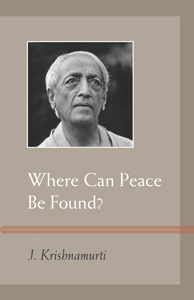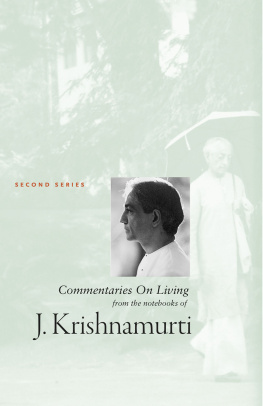Krishnamurti - Krishnamurti in India 1974-75
Here you can read online Krishnamurti - Krishnamurti in India 1974-75 full text of the book (entire story) in english for free. Download pdf and epub, get meaning, cover and reviews about this ebook. publisher: Krishnamurti Foundation Trust, genre: Religion. Description of the work, (preface) as well as reviews are available. Best literature library LitArk.com created for fans of good reading and offers a wide selection of genres:
Romance novel
Science fiction
Adventure
Detective
Science
History
Home and family
Prose
Art
Politics
Computer
Non-fiction
Religion
Business
Children
Humor
Choose a favorite category and find really read worthwhile books. Enjoy immersion in the world of imagination, feel the emotions of the characters or learn something new for yourself, make an fascinating discovery.

- Book:Krishnamurti in India 1974-75
- Author:
- Publisher:Krishnamurti Foundation Trust
- Genre:
- Rating:3 / 5
- Favourites:Add to favourites
- Your mark:
- 60
- 1
- 2
- 3
- 4
- 5
Krishnamurti in India 1974-75: summary, description and annotation
We offer to read an annotation, description, summary or preface (depends on what the author of the book "Krishnamurti in India 1974-75" wrote himself). If you haven't found the necessary information about the book — write in the comments, we will try to find it.
Krishnamurti in India 1974-75 — read online for free the complete book (whole text) full work
Below is the text of the book, divided by pages. System saving the place of the last page read, allows you to conveniently read the book "Krishnamurti in India 1974-75" online for free, without having to search again every time where you left off. Put a bookmark, and you can go to the page where you finished reading at any time.
Font size:
Interval:
Bookmark:
Krishnamurti in India 1974-75
Copyright 1976 Krishnamurti Foundation Trust Ltd.
KRISHNAMURTI IN INDIA
1974-75
Contents
: 7th December 1974
: 8th December 1974
: 14th December 1974
: 15th December 1974
: 25th January 1975
: 26th January 1975
I wonder why you come to listen to me. Is it out of curiosity or do you want to find out what the speaker has to say? If you want to find out what he has to say, you have to listen. To listen is an art. The word art means to put everything in its right place. That is the real meaning of the word art. And if you are going to listen this evening to a discourse, you have to listen, not with your own opinions, your prejudices or your conclusions and ideas but rather listen, neither agreeing nor denying nor disagreeing. To listen requires a certain form of communication between the speaker and yourselves. Communication implies not only verbal exchange but also to think together, and share together the thing that lies behind the words, to read between the lines, to have an insight. So, listening is not only an art, but a responsibility. And if you are at all serious, faced with a declining, degenerating world, especially in this country, then a quality of mind that demands to investigate, to explore, to examine, is required.
We have not only personal problems but also peripheral issues like inflation, overpopulation, economic chaos and so on. A serious mind demands and must find an answer to why there is this decline. There is a sense of total unrelatedness to world events; each one is concerned with his own problem, with his own survival, with his own security, with his own personal salvation. All this indicates a mind, a heart that is becoming more and more incapable of dealing with the problem as a whole. We have to find an answer because there is so much suffering, incalculable misery, a despair of which one may not be aware or conscious, but it is there. We are not exaggerating, not being pessimistic, but merely stating what is going on. Technologically there is extraordinary improvement but human beings are not keeping up with that rapid growth in technology. Seeing all thiswars, corruption, a social structure that is totally immoral, division, conflict, suffering and the brutal violence that is spreading throughout the worldif one is earnestly wanting to enquire into it, then that enquiry demands on your part an observation which is not judged, which is not prejudiced, which is not parochial, which is not Hindu or any other particular race or caste. To investigate, there must be freedom; otherwise you cannot investigate. That is obvious. If you want to find out something, your mind must be free to enquire, must not be caught in its own prejudices, in its own beliefs and conclusions. That is the first requirement of any enquiry, any examination, and I hope we can do this together.
What is the reason of this decay? We are not seeking peripheral reasons, not reasons which are superficial, which any economist or socialist or philosopher invents or describes. What has happened to the mind? This is a question one asks after fifty years of coming to this country every winter and seeing the decline every year. Please, do not agree or disagree, but examine why this has happened. Do you enquire of some philosophical association or do you enquire through an idealistic formula or do you enquire what you are, what you have become? That is where the enquiry has to begin; otherwise it has no value; otherwise it becomes merely an amusing entertainment, an enquiry without any result. So, to enquire, you have to enquire within yourself why human beings, living in this country, have allowed themselves to be what they are, what they have become. You have become non-religious, though you may do puja three times a day, go to temples, follow innumerable gurus, read the Gita, the Upanishads. These are extraneous events, what other people have said; and by reading those books, you think you are religious; by going to some guru and worshipping him, by following his system of meditation, you think you are becoming extraordinarily religious; or by going to somebody who does some miracle, you think you have found religion. So, if you observe yourselves very seriously, you have to ask yourselves whether you are really religious. The word religion means, according to the dictionary, gathering of your energy, intellectual, physical, psychologicalall your energy so that it is totally aware of all its activities. It is a holistic activity concerned with the whole, not segmented. That is what religion means. Are you so religious?
Thought plays an extraordinary part in our lives; it has done extraordinary things; it has created the whole scientific field of knowledge, the whole world of medicine and so on. Thought also has created wars, divided people. Thought has separated religions; thought has created the gods which you worship, the saviours, the gurus, your Rama, Sita, the Mastersthat whole field is the projection of thought. So, you have created your gods whom you worship. Are you observing all this? That thought, your daily thought, has accumulated tremendous knowledge in one field and that knowledge is operating in the technological world, and that thought as knowledge is destroying human beings. I will explain as we go along. Have you also observed yourselves that you are functioning, thinking, acting, according to knowledge? Knowledge means experience, accumulated memory, and you are acting, functioning according to that memory which has become mechanical. And as thought is fragmentarythought is never wholeall action becomes fragmentary. So knowledge in one field, in one area, is absolutely necessary, but if the mind merely functions from knowledge, as we all do, then it becomes mechanical and the decline begins. Knowledge to which you give such tremendous importance is always in the past, and that past which is knowledge is tradition, and when you are acting, living in that area, as you do, then the mind must become mechanical. That is, memory is experience and knowledge, stored up in the brain, and that knowledge is reacting all the time. You can observe it in yourself.
We say that one of the basic reasons for the decline of the people in this country is that they are living in an area of mechanical knowledge and therefore the mind must decline. The mind must degenerate when you are living according to the knowledge of others. Discover it for yourself, the truth of it, the fact of it that you are living on knowledge, on tradition, which is a continuity of knowledge. A civilization, a culture, a people that live merely on knowledge must inevitably decline. And to find out a way of living which is non-mechanical, which is not based on knowledge, is regeneration. That is, in one area, knowledge is essential; otherwise you cant go home, you cant understand English, you cant recognize your wife, your husband. Knowledge in that area is necessary. But when the mind lives, merely nourished by memory, by knowledge of others, then the inevitable decline takes place. So, is it possible to live a life where the area of knowledge is sustained and to act in relationship without continuity of knowledge from day to day? You understand my question? You see I am using the word knowledge in the sense of accumulated experience in human relationship which becomes memory stored up in the brain and according to that memory, I respond. This is absolutely necessary in the field of technology, but in the field of relationship between human beings, it becomes a destructive and a mechanical thing which prevents what one calls love.
Have you ever gone into the question of what love is? Have you gone into it to find out that extraordinary thing which you call love, compassion? Is compassion knowledge? Is compassion the cultivation of thought? Is love a mere remembrance of certain incidents, knowledge? One asks: is there love in this country?please, I am not saying it does or doesnt exist in Europe, America or Russia; I am asking you non-comparatively. Have you reduced love to sex, pleasure, or has it become duty, responsibility, a thing which is the outcome of a comfortable life or something which you call devotion? You understand all my questions? Because, it may be that this factor is responsible for the decline, for degeneration, for the fact that there is no love in your heart and that you are living entirely within the field of knowledge.
Next pageFont size:
Interval:
Bookmark:
Similar books «Krishnamurti in India 1974-75»
Look at similar books to Krishnamurti in India 1974-75. We have selected literature similar in name and meaning in the hope of providing readers with more options to find new, interesting, not yet read works.
Discussion, reviews of the book Krishnamurti in India 1974-75 and just readers' own opinions. Leave your comments, write what you think about the work, its meaning or the main characters. Specify what exactly you liked and what you didn't like, and why you think so.







